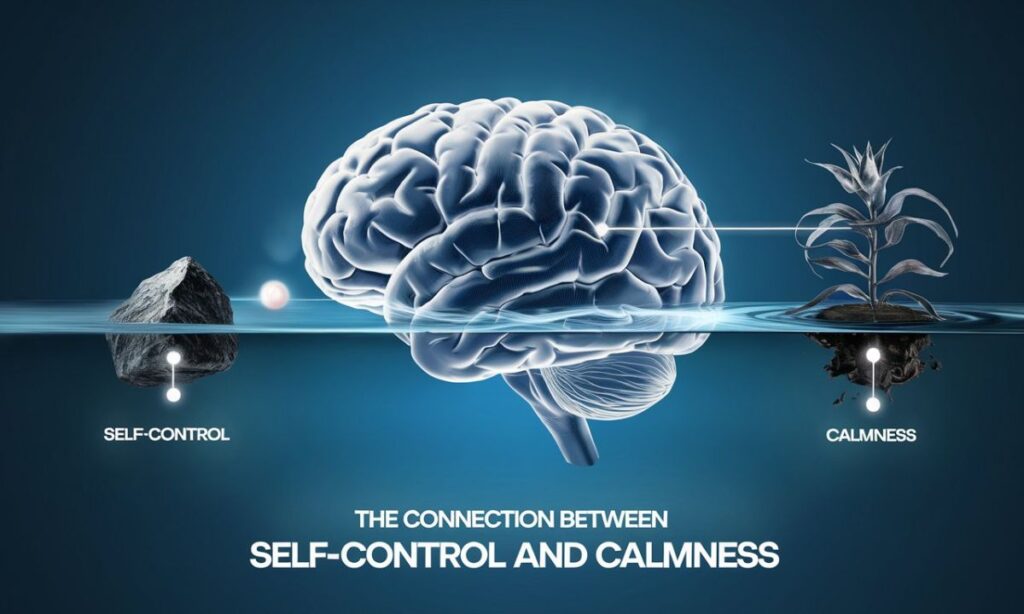In today’s fast-paced world, we’re often swept up in a whirlwind of emotions, decisions, and stress. But what if I told you there’s a way to navigate this chaos with grace and power? Enter the wisdom of Tymoff: “Awareness About Self-control Is Strength. Calmness Is Mastery. You.”
This profound statement isn’t just a catchy phrase – it’s a roadmap to personal growth and emotional intelligence that can transform your life.
What is Self-Control?
Self-control is more than just a buzzword in self-help circles – it’s a fundamental human capability that sets us apart from other species. It’s the inner strength that allows us to override our immediate impulses in favor of long-term goals. But what’s happening beneath the surface when we exercise self-control?
Neuroscientists have discovered that self-control primarily originates in the prefrontal cortex, the brain’s command center. This region is responsible for executive functions like planning, decision-making, and impulse control. When you resist the urge to check your phone during an important meeting or choose a salad over a burger, your prefrontal cortex is working overtime.
Interestingly, self-control isn’t a fixed trait. Like a muscle, it can be strengthened with consistent exercise. Each time you successfully resist a temptation, you’re essentially doing a rep for your self-control muscle, making it stronger for future challenges.
Consider this scenario: You’re scrolling through social media late at night, knowing you have an early meeting tomorrow. That little voice in your head says, “Just five more minutes.” But your self-control kicks in, reminding you of the importance of a good night’s sleep. You put the phone down and turn off the lights. That’s self-control in action – choosing long-term benefits over short-term pleasure.
The Importance of Self-Control

Self-control isn’t just a nice-to-have skill – it’s a cornerstone of personal and professional success. Think of it as the invisible force that steers you towards your goals, even when temptation whispers in your ear. It’s what keeps you focused during a crucial project, helps you stick to your budget, and stops you from devouring that entire pint of ice cream in one sitting.
But self-control’s importance goes beyond just willpower. It’s a key component of emotional intelligence, allowing you to navigate social situations with grace and maintain healthy relationships. Studies have shown that individuals with high self-control tend to be happier, healthier, and more successful in various aspects of life.
They’re better at managing stress, making sound decisions, and achieving long-term goals. In essence, self-control is like a superpower – it empowers you to shape your life according to your values and aspirations, rather than being at the mercy of impulses and short-term gratification.
1. Emotional Stability
Emotional stability is like a sturdy ship navigating through stormy seas. Self-control acts as the ship’s rudder, helping you maintain direction even when emotions threaten to capsize you.
People with high emotional stability tend to:
- Recover more quickly from setbacks
- Handle criticism constructively
- Maintain a positive outlook during challenging times
- Make rational decisions even under emotional stress
Case Study: Let’s revisit Sarah, our marketing executive. Before developing her self-control, Sarah’s emotional outbursts were costing her team’s morale and productivity. She decided to work with a coach to enhance her emotional intelligence and self-control.
Sarah started practicing mindfulness techniques, learning to recognize her emotional triggers, and developing strategies to respond rather than react. Within six months, her team reported a 40% increase in job satisfaction, and project completion rates improved by 25%. Sarah’s journey shows how enhancing self-control can lead to tangible improvements in professional and personal life.
2. Improved Relationships
Self-control is the secret ingredient in the recipe for healthy relationships. It’s what stops us from saying something hurtful in the heat of an argument or helps us be patient when our partner is having a bad day.
Here are some ways self-control enhances relationships:
- Active Listening: Instead of interrupting or thinking about your response, self-control helps you truly listen and understand the other person’s perspective.
- Conflict Resolution: It allows you to approach disagreements calmly and rationally, focusing on solutions rather than blame.
- Emotional Support: Self-control helps you provide consistent emotional support, even when you’re dealing with your own stress.
- Trust Building: By consistently keeping promises and maintaining confidentiality, self-control builds trust over time.
Exercise: Try the “Count to 10” technique. Next time you’re in a heated discussion and feel the urge to say something you might regret, pause and count to 10 silently. This brief moment can help you regain composure and respond more thoughtfully.
3. Goals and Financial Responsibility
The link between self-control and achievement is well-documented. The famous “marshmallow test” conducted by psychologist Walter Mischel in the 1970s beautifully illustrates this connection.
In the study, children were given a choice: eat one marshmallow now, or wait 15 minutes and get two marshmallows. The researchers then followed these children into adulthood. The results were striking:
| Outcome | High Self-Control Group | Low Self-Control Group |
| Average SAT Score | 210 points higher | 210 points lower |
| Body Mass Index | Lower | Higher |
| Substance Abuse Rates | Lower | Higher |
| Income | Higher | Lower |
This study demonstrates how early self-control can predict future success. But don’t worry if you were the kid who ate the marshmallow right away – self-control can be developed at any age!
When it comes to financial responsibility, self-control is your best friend. It’s what helps you stick to a budget, save for retirement, and resist impulse purchases. Here are some practical tips to boost your financial self-control:
- Use the 24-hour rule: For non-essential purchases, wait 24 hours before buying. This cooling-off period often reduces the impulse to buy.
- Automate savings: Set up automatic transfers to your savings account to remove the temptation to spend that money.
- Visualize your financial goals: Keep a picture of your dream house or dream vacation as your phone wallpaper to remind you why you’re saving.
4. Stress Management and Better Decisions
In our high-stress world, self-control acts as a buffer, helping us navigate challenges with grace and resilience. It’s not about never feeling stressed – it’s about managing our response to stress effectively.
Self-control influences decision-making in several ways:
- Emotional Regulation: By managing our emotions, we can make decisions based on logic rather than fleeting feelings.
- Impulse Control: Self-control helps us resist the urge to make rash decisions, allowing time for careful consideration.
- Delayed Gratification: It enables us to prioritize long-term benefits over short-term pleasures.
- Cognitive Flexibility: Self-control is linked to better cognitive flexibility, allowing us to adapt our thinking and consider multiple perspectives when making decisions.
Fact: A study published in the Journal of Personality and Social Psychology found that individuals with high self-control were less likely to experience decision fatigue and made more consistent choices over time.
Cultivate Self-Discipline: Proving Self-control is Strength. Calmness is Mastery. You – Tymoff
Developing self-discipline is like building a house – it takes time, effort, and consistency. But the results are worth it. Here’s an expanded look at strategies to boost your self-control:
- Practice mindfulness: Mindfulness meditation can increase your awareness of thoughts and feelings, allowing you to respond rather than react. Start with just 5 minutes a day and gradually increase.
- Set clear goals: Having a clear vision of what you want to achieve can bolster your resolve. Use the SMART criteria (Specific, Measurable, Achievable, Relevant, Time-bound) when setting goals.
- Create routines: Healthy routines reduce decision fatigue and make self-control easier. Try to establish a morning routine that sets a positive tone for the day.
- Get enough sleep: Lack of sleep impairs self-control. Aim for 7-9 hours nightly. Create a relaxing bedtime routine to improve sleep quality.
- Exercise regularly: Physical activity boosts willpower and reduces stress. Find an exercise you enjoy – it doesn’t have to be intense gym sessions. Even a daily walk can make a difference.
- Practice self-compassion: Be kind to yourself when you slip up. Self-compassion has been linked to greater motivation and better self-control in the long run.
- Use if-then planning: This involves creating a specific plan for how you’ll deal with temptations. For example, “If I feel the urge to check social media during work hours, then I’ll take three deep breaths and refocus on my task.”
Remember, developing self-control is a journey. Celebrate small victories along the way, and don’t be discouraged by setbacks. As Tymoff wisely noted, awareness about self-control is strength – and you’re already on the path by seeking to improve.
Understanding Calmness

Calmness is often misunderstood. It’s not about being passive or emotionless – it’s about maintaining inner peace and clarity, even in challenging situations. Think of it as the eye of the storm, where everything around you might be chaotic, but you remain centered and composed.
Physiologically, calmness is associated with a decrease in stress hormones like cortisol and an increase in feel-good neurotransmitters like serotonin. This state allows our bodies and minds to function optimally, enhancing our ability to think clearly, make sound decisions, and maintain good health.
Significance of Calmness
The benefits of cultivating calmness extend far beyond just feeling good. Here’s a deeper look at why calmness is so crucial:
- Enhanced Problem-Solving: When we’re calm, our prefrontal cortex – responsible for complex thinking and problem-solving – functions better. This allows us to approach challenges with clarity and creativity.
- Improved Physical Health: Chronic stress can wreak havoc on our bodies, leading to issues like high blood pressure, weakened immune system, and digestive problems. Calmness counteracts these effects, promoting overall physical well-being.
- Better Relationships: Calm individuals tend to communicate more effectively and empathetically, leading to stronger, more positive relationships.
- Increased Resilience: Regular practice of calmness techniques builds emotional resilience, helping us bounce back more quickly from setbacks.
- Enhanced Productivity: A calm mind is a focused mind. By reducing mental clutter and anxiety, calmness can significantly boost productivity and efficiency.
How to Master Calmness?
Mastering calmness is a lifelong journey, but here are some expanded techniques to help you along the way:
Stay Calm with Meditation

Meditation is a powerful tool for cultivating calmness. It’s like a gym for your mind, strengthening your ability to stay centered amidst life’s storms.
Try this progressive meditation technique:
- Start with 5 minutes a day
- Sit comfortably and focus on your breath
- When your mind wanders, gently bring it back to your breath
- Each week, add 1 minute to your practice
- Aim for 20 minutes daily after a few months
Remember, consistency is key. A short daily practice is more effective than occasional long sessions.
Get Enough Sleep
Quality sleep is crucial for emotional regulation and calmness. During sleep, our brains process emotions and consolidate memories, helping us start each day with a fresh, calm perspective.
Tips for better sleep:
- Stick to a consistent sleep schedule, even on weekends
- Create a relaxing bedtime routine (e.g., reading, light stretching, or listening to calm music)
- Make your bedroom a sleep sanctuary – dark, quiet, and cool
- Avoid screens for at least an hour before bed
- Limit caffeine and alcohol, especially in the evening
Eat a Healthy Diet
What we eat significantly affects our mood and ability to stay calm. A balanced diet rich in whole foods can help stabilize mood and energy levels.
Calming Foods:
- Leafy greens (rich in magnesium, which helps regulate neurotransmitters)
- Fatty fish (high in omega-3 fatty acids, linked to reduced anxiety)
- Nuts and seeds (contain tryptophan, which helps produce serotonin)
- Fermented foods (may positively influence the gut-brain axis)
- Dark chocolate (in moderation, can reduce stress hormones)
Remember, hydration is key too. Even mild dehydration can affect mood and cognitive function.
Exercise Regularly
Physical activity is a natural stress-buster and mood-lifter. It releases endorphins, improves mood, and helps burn off excess energy that might otherwise manifest as anxiety.
Quick Calming Workout:
- 5 minutes of jumping jacks or jogging in place
- 10 push-ups (modified if needed)
- 15 squats
- 20 seconds of plank
- 5 minutes of yoga stretches
- 5 minutes of deep breathing or meditation
Repeat this circuit 2-3 times for a quick, stress-relieving workout. Remember, the goal is consistency, not perfection. Even a short walk can make a difference in your mood and stress levels.
Connect with Nature
Nature has a profound calming effect on our minds and bodies. Studies have shown that spending time in nature can reduce stress hormones, lower blood pressure, and improve overall well-being.
Nature Connection Challenge:
- Spend at least 20 minutes in nature every day for a week
- Try different activities: walking, sitting quietly, gardening, or even working outside
- Notice the details: colors, textures, sounds, and smells
- At the end of the week, reflect on how it affected your stress levels and overall sense of calm
Even if you live in an urban area, you can connect with nature by visiting local parks, tending to houseplants, or even watching nature documentaries.
Set Realistic Expectations
Unrealistic expectations are a recipe for stress and disappointment. Learning to set achievable goals can help maintain a sense of calm and control.
When setting goals, use the SMART criteria:
- Specific: Clearly define what you want to achieve
- Measurable: How will you know when you’ve reached your goal?
- Achievable: Is this goal realistic given your current resources and constraints?
- Relevant: Does this goal align with your broader life objectives?
- Time-bound: Set a realistic deadline
Remember, it’s okay to dream big, but break those big dreams into smaller, manageable steps. Celebrate small victories along the way to maintain motivation and a sense of progress.
By incorporating these expanded techniques into your daily life, you’ll be well on your way to mastering calmness and reaping its many benefits. Remember, as Tymoff suggests, calmness is mastery – and it’s a skill that’s within your reach.
The Connection Between Self-Control and Calmness

Self-control and calmness are two sides of the same coin. Self-control helps us maintain calmness in challenging situations, while calmness gives us the mental space to exercise self-control.
“The ability to control one’s feelings and overcome one’s weaknesses; the ability to restrain oneself in the face of temptation.” – Tymoff
This synergy between self-control and calmness is what Tymoff refers to when he says, “Awareness About Self-control Is Strength. Calmness Is Mastery. You.”
Who said self-control is strength, calmness is mastery?
This profound statement is attributed to Tymoff, though details about this individual are limited. The quote encapsulates a deep understanding of personal development and emotional intelligence.
What are the three 3 habits of self-control?
While there’s no universally agreed-upon set of three habits, here are three fundamental practices that can significantly boost self-control:
- Mindfulness: Being aware of your thoughts, feelings, and surroundings.
- Goal-setting: Having clear, achievable objectives to work towards.
- Delayed gratification: The ability to resist immediate rewards for long-term benefits.
What is the theory of self-control strength?
The self-control strength theory, also known as ego depletion theory, suggests that self-control is a limited resource that can be depleted with use. Like a muscle, it can be strengthened with practice but also fatigues with overuse.
Recent studies have challenged this theory, suggesting that belief in one’s self-control abilities might be more important than an actual limited resource.
What is the difference between self mastery and self-control?
While closely related, self-mastery and self-control have subtle differences:
| Self-Control | Self-Mastery |
| The ability to regulate thoughts, emotions, and actions | The ongoing process of personal growth and improvement |
| Focuses on restraint and discipline | Encompasses a broader range of skills and attributes |
| Can be situation-specific | A more holistic approach to life |
| A component of self-mastery | The ultimate goal of personal development |
In essence, self-control is a crucial tool in achieving self-mastery. It’s the day-to-day practice that leads to the broader state of self-mastery.
Remember, the journey to self-control and calmness is uniquely yours. Embrace it, learn from it, and watch as you transform into the best version of yourself.
Conclusion
In the journey of life, self-control and calmness are your most reliable companions. They’re not just abstract concepts, but practical tools that can transform your daily experiences. Remember, as Tymoff wisely noted, you are at the center of this transformation. With awareness, practice, and patience, you can cultivate the strength of self-control and the mastery of calmness.
Also Read : Still Being Tested as an App Nyt Crossword Clue Final Answer











